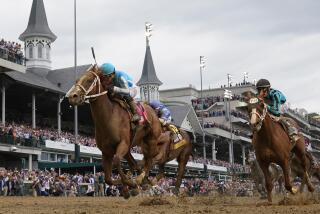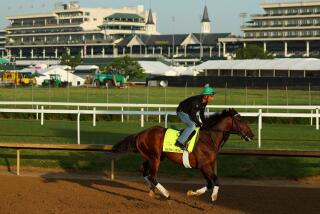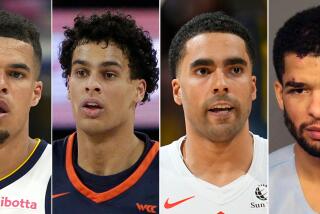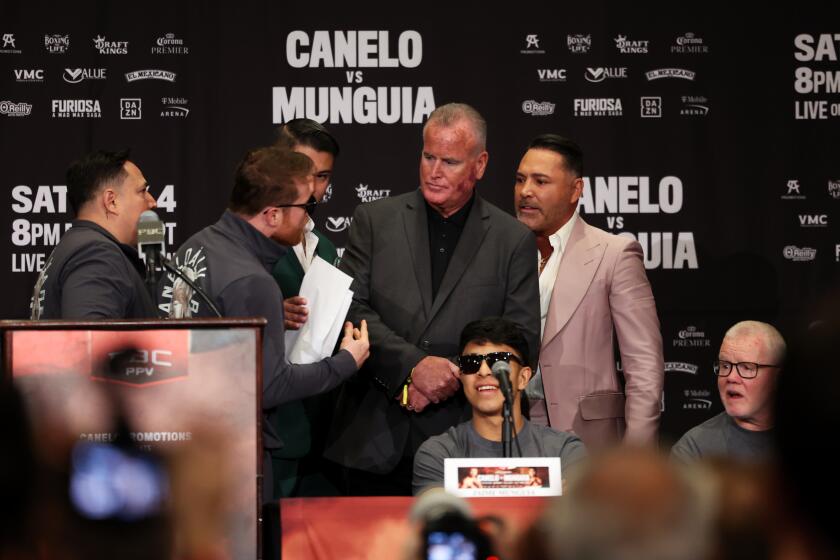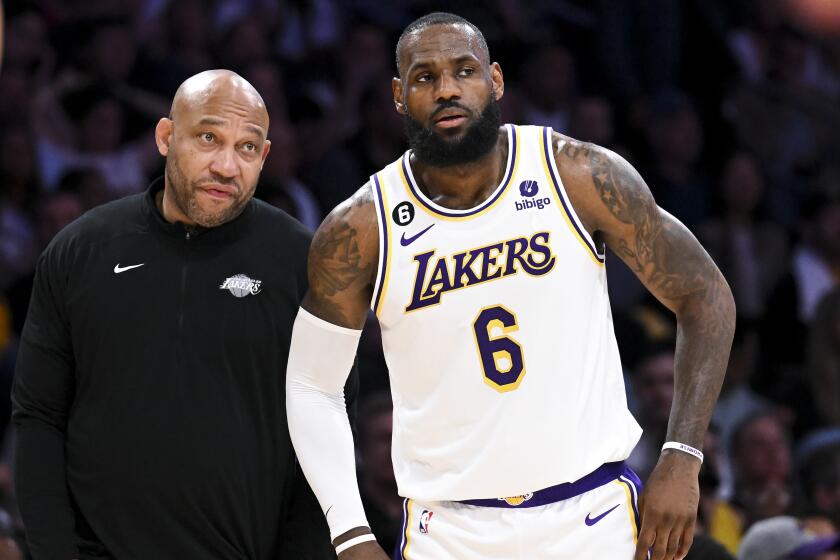FAREWELL TO FAT : Seattle’s Fast-Food Crisis: Once-Bloated Huskies Are Turning Lean and Mean
One thing to know about the Washington offensive line this season, in case it’s not easily distinguishable on television in Saturday’s game against UCLA:
The Huskies are less husky.
Coach Don James, alarmed last season by the listlessness of his once-massive interior linemen, put them on a diet last winter.
It wasn’t that they hadn’t pulled their weight in a 7-4-1 season.
They had pulled too much weight.
James noticed that his linemen bogged down in the second half, especially in losses to Texas A&M;, Oregon, USC and UCLA, and a tie against Arizona, all of which outscored the Huskies in the final 2 quarters.
Arizona outscored the Huskies, 11-0, in the second half of a 21-21 tie. A week later, UCLA powdered them in the last 2 quarters, 31-0, en route to a 47-14 victory.
James, evaluating the season last winter, concluded that his linemen had, in a manner of speaking, outgrown the competition.
“They got too big,” James told a group of reporters last summer. “Somebody had to put their foot down. I was the guy. I got tired of seeing fat guys.”
Thus the diet.
Or rather, the nutritional re-education of a group of junk-food aficionados accustomed to eating whatever was set in front of them, whenever they wanted.
Fast-food outlets in the Northwest may never be the same.
“We want them to eat three meals, but we want them to eat the right stuff,” said Dan Dorazio, who coaches the Huskies’ offensive linemen. “They might eat more in terms of quantity, but their caloric intake is a lot less. We’re really stressing fibers and grains, fruits and vegetables.
“Lessening the (intake of) saturated fat was the key.”
Last spring, the bloated blockers, as one Seattle reporter dubbed them, were required to weigh in regularly and file weekly meal plans with Dorazio, who monitors his own diet to the point of logging everything he eats.
Those who failed to do so, or showed no progress, were required to report at 5:30 a.m. to ride a stationary bike for 30 minutes.
Known as the Breakfast Club, that group quickly disbanded as the players began to realize the benefits of a more nutritional diet.
“We’ve had great results,” Dorazio said. “The guys on the plan have all dropped pounds and body fat. We’ve had significant changes from the people who really needed to work on it.”
And in a 35-31 victory over San Jose State last week, the Huskies put together an 80-yard drive late in the fourth quarter to pull out the victory after squandering a 28-0 second-quarter lead.
Washington is 3-0, having also put together two fourth-quarter scoring drives in a 20-6 season-opening victory over Purdue.
These Husky blockers are bloated no more. This is a lean, mean blocking machine.
“I feel a lot better,” said Michael Zandofsky, a two-time All-Pacific 10 Conference selection who dropped his weight from 299 pounds to 285 and reduced his body fat from 19.6% to 14.4%. “I feel like I’m a little quicker. It’s really helped . . . being able to compete in the fourth quarter.”
Zandofsky said he has all but eliminated junk food from his diet.
“Now I cook something up at home--whatever my meager cooking skills will allow,” he said.
His teammates do the same.
Guard Kelly John-Lewis, who weighed as much as 328 pounds last season, is down to 290. Center Bern Brostek is down from 288 to 270.
“Our guys were ridiculous,” Dorazio said. “They were eating pizzas late at night, and the worst thing they were doing was skipping breakfast and loading up at night.
“They were just into poor nutritional habits. We had a lot of guys who didn’t understand. They just really had no clue.”
One of them who did have a clue, guard Brett Wiese, welcomed the change. Wiese, who watched his diet long before he was required to, weighs 284 pounds but has less than 11% body fat.
“A lot of guys couldn’t hang on in the fourth quarter (last season),” Wiese told the Seattle Post-Intelligencer. “They were slow off the ball. They were sucking air. They just wanted to get the play done.”
Obviously, that wasn’t something the coaches wanted to see.
“The big thing we tried to point out is: If you eat right, what you gain is a tremendous amount of energy,” Dorazio said. “It’s amazing how you feel when you eat a lot of complex carbohydrates.
“If you balance that with proper rest and training, you’re going to feel like a million bucks.”
Especially in the fourth quarter.
More to Read
Get our high school sports newsletter
Prep Rally is devoted to the SoCal high school sports experience, bringing you scores, stories and a behind-the-scenes look at what makes prep sports so popular.
You may occasionally receive promotional content from the Los Angeles Times.
